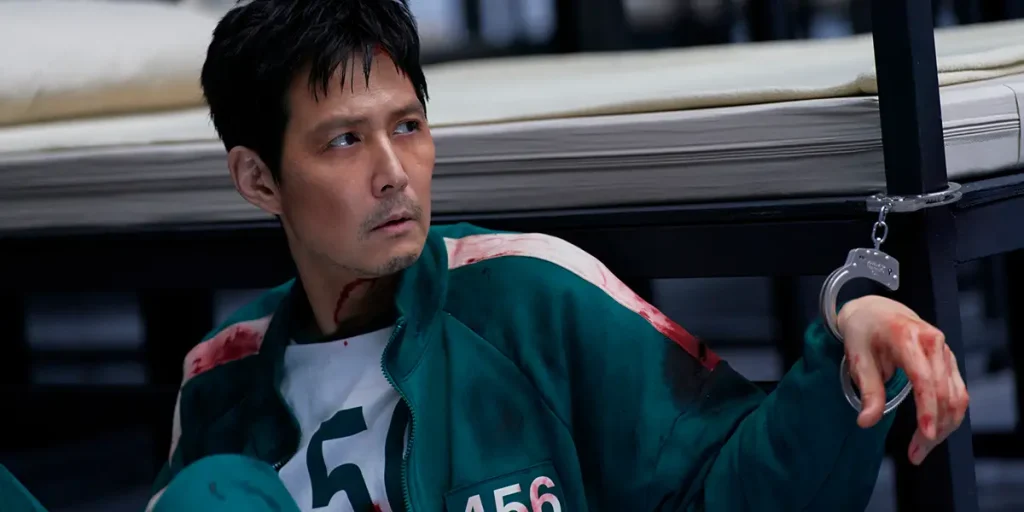Squid Game season 3 features rushed conclusions, plot and character inconsistencies, and fails to deliver a satisfying resolution.
This review of season 3 of Squid Game contains spoilers from season 2.
Writer, Director and Showrunner: Hwang Dong-hyuk
Genre: Action, Crime, Drama, Mystery, Thriller
Number of Episodes in Season 3: 6
Release Date: June 27, 2025
Where to Watch: Stream it globally on Netflix
As I sit here writing my review of Squid Game season 3, I’m overwhelmed by a deep sense of sadness. I’ve been counting the days till the release of the third and final season since the release of season 2 in December, and the series is all I’ve been talking about. This show and its characters have meant a great deal to me, and I consider seasons 1 and 2 storytelling masterclasses for differing yet unique reasons. Due to this, I felt confident that writer/director Hwang Dong-hyuk would deliver a satisfying conclusion.
However, after the first two episodes of Squid Game season 3, my excitement grew into concern regarding the show’s direction. By the end of the sixth episode, I was perplexed by some of the narrative decisions and inconsistencies within the story.
The show picks up right where things left off at the end of season 2. The attempted rebellion has failed, and in a dark twist of fate and a move that even I didn’t see coming, Front Man (Lee Byung-hun) brutally shoots Player 390, Jung-Bae (Lee Seo-hwan) right in front of Gi-hun (Lee Jung-jae). Due to witnessing his best friend’s death, which is a result of his decision to take down the games, player 456 is now a completely broken man. He doesn’t understand why his life was spared and is in a state of shock. In the first few episodes, he is experiencing PTSD and guilt, so much so that we get very little dialogue from him.
It’s not long before the competition resumes, with the next game being one of the most impactful, emotional, and well-executed of the series. Before the show’s release, Hwang had mentioned in an interview that this would be a challenging game for fans to watch, and the hype is real. I found this game, called keys and knives, more difficult to watch than episode 6 of season 1, titled “Gganbu,” which features the gut-wrenching, unforgettable marbles game.
This says a lot, considering that particular game is regarded as the most heartbreaking in the entire series, yet, somehow, keys and knives is even worse. During this game, you will see some characters at their most selfless and others at their absolute worst. Every single minute is anxiety-inducing and devastating to watch. As a viewer, you are overwhelmed with sorrow and despair due to the unavoidable situation the players who voted to leave the island have found themselves in, as well as the sadistic nature of the establishment.
Up until this point, Squid Game season 3 is on its A-game. That is, until episode 3 arrives, and the story starts to fall apart. As I reflected on each memorable and beloved player we meet throughout the series, it reaffirmed one of Squid Game’s many highlights: the strength of the show’s writing in terms of its characters. In season 2, fans are introduced to a whole new group of people, and Hwang does a fantastic job of making viewers emotionally invested in some of them within a relatively short period of time. Before season 3 was released, I saw numerous online posts people made discussing their favorite characters from season 2 and how protective they are of each of them. They hoped that even if they did end up dying, which feels inevitable in this universe, given the circumstances, they would at least have a compelling character arc by the time the series drew to a close. As a mega fan myself, I shared the same sentiment.
With Squid Game’s fandom so vast, dedicated, and deeply attached to some of the players, one of the most significant issues with season 3 is that most of the likable characters are killed off way too early in the story. The result is that the majority of people we neither like nor care about are present for the remainder of the episodes. This not only diminishes viewers’ emotional attachment to the narrative but also leaves some of the most despicable characters in the game. That is the point of the whole series, reflecting the lowest aspects of humanity and how selfishness can bring out the worst in people, but this choice feels wrong.
The deplorable players are mostly individuals we didn’t even recognize until this point and who had very little screen time in season 2. What else weighs heavy on my heart is how rushed some of the cherished players’ deaths feel. With such a big cast of side characters left in the game at the beginning of season 3, some of them were written out with little consideration given to their arcs at all. This is a great shame, and quite frankly, they deserved better. Intriguing seeds are planted in season 2, centering around specific characters and plot points, yet the majority of them don’t come to fruition in season 3. It’s perplexing and incredibly disappointing.
By episode 3, the VIPs are back in the game, and the show has managed to find a group of characters who deliver even more cringe-inducing dialogue than what was experienced in season 1. Only, back then, the story was so solid that this glaring weakness could be overlooked. Given the show’s success, I’m surprised that there isn’t a single member of the production team, or even someone who could have been hired, to offer guidance on the corny dialogue and suggest ways to execute it more effectively. It’s so bad that it completely diminishes the drama and feels entirely out of place in the show. Due to this major flaw, you can’t take any of the VIPs remotely seriously. They’re present at the games, yet they don’t add anything to the narrative that we haven’t already seen before. So, there’s that, too. But at least they showed up, I guess.

Another issue lies with the most essential character, our protagonist, Gi-hun. Despite his suffering, the decisions he makes in season 3 seem entirely out of place, and he often feels diminished to a side player, merely standing there like a spare one amidst all of the chaos. Part of what makes 456 so lovable is his unyielding dedication to seeking justice and finding a way to bring the entire operation to a halt. Sadly, none of that is reflected much in season 3, as even his journey gets bogged down by the unrelenting evil of those surrounding him, which the story appears to be much more focused on.
One positive aspect of Squid Game season 3 is the new games. As mentioned earlier, the first game played is even more cruel and intense than those that came before it, and it’s an extremely pivotal moment in the show. Hwang never disappoints when delivering new, creative games that pay homage to child games played by many kids in Korea when they are young. Well, minus the death part, of course. There are also iconic aspects from previous games that are reintroduced in season 3, fitting into Squid Game’s lore.
With each new game, the stakes become greater. The body count also grows higher while the deaths become even more violent and bloodier. Yet, with such well-developed games integrated into the final season, I kept thinking how much more impactful they would have been if likable characters were still present during some of them. If those players had stayed in the games for longer, their stories could have been explored in meaningful ways through gameplay, making their arcs all the more compelling by the series’ conclusion.
Although many characters face abrupt, untimely deaths, some familiar faces remain after the fact, and each of their stories will continue to hold viewers’ interest. Unfortunately, the ball is dropped once again, with one of the most crucial plot points of the entire series going absolutely nowhere and turning out to be completely meaningless. Another letdown is a character who could have had a powerful journey of growth but instead launches into full-on villain mode at the last minute. To make matters worse, the confrontation between Front Man and Gi-hun is overhyped and downright underwhelming. These writing decisions are puzzling, especially since season 2 had built up some of these characters and their plot points, only to abandon any follow-through in the final season.
Once we reach the end of Squid Game season 3, there is a glimmer of hope for some characters, and the show somewhat delivers on its overall theme of what Gi-hun stands for as a person, which one can appreciate. The issue, however, is the rocky path taken to convey this underlying message through out-of-character behavior, baffling choices that don’t make much sense, and our protagonist feeling demoted narratively.

There were many directions this show could have taken in season 3 to make it one of the greatest series of all time. Yet, ultimately, the story’s conclusion falls short in terms of both impact and a thoroughly satisfying resolution. I cried a total of five times during this season, which indicates that it had a profound emotional impact on me. That said, most of those instances were due to judgments made within the story that felt misguided and careless.
Before Squid Game season 3 aired, I was convinced that this review would have been five stars. I am still in disbelief that the result of season 3 is a review that leans more negative than positive. I’ll still cherish the show’s first two seasons, but as a big fan of Squid Game, I’ll forever be haunted by yet another beloved show ending in such a disappointing way.
Squid Game Season 3 (Netflix): Series Plot & Recap
Synopsis:
After the failed rebellion, the competition continues. Only this time, the stakes are even higher, and the rules of each game are more vicious. When an expected event occurs on the island, Gi-hun is faced with yet another tough decision.
Pros:
- Some exceptional new games are introduced in season 3. They meet creative expectations while staying true to the show’s lore.
- The fate of Gi-hun reflects his morals as a character in a somewhat effective way.
- The show’s first two episodes are top-tier and of equal quality to the rest of the series.
Cons:
- Lovable characters are killed off too early, leaving us with many players we don’t even know, let alone care about.
- Gi-hun’s overall storyline this season feels odd, as he’s diminished to what feels like a side character, with little to do while other evil personalities take center stage.
- Many side characters’ storylines are wrapped up too abruptly. Some receive little screen time and aren’t given the satisfying arcs that they deserve.
- One particular plot point, which has been built up for quite some time, ends up going nowhere, which is one of the show’s most perplexing missed opportunities.
- Some players act out of character, which only adds to the plot holes and inconsistencies throughout the season.
Squid Game Season 3 is now available to stream globally on Netflix.

